Japanese women walk down a Tokyo shopping street. (Mark Kolbe/Getty Images)
日本女孩走在东京购物街上。(马克﹒柯比/华盖创意)

People in Japan are so averse to romantic relationships that the country's media even has a name for it: sekkusu shinai shokogun, or "celibacy syndrome," according to a widely circulated Guardian story on the country's low rates of marriage, childbearing and even sex.
日本人对于恋爱是如此的反感,以至于日本媒体根据一个广为流传的卫报报道创造了一个新名词 – ‘セックスしない症候群',即‘独身主义综合症'来形容日本的低结婚率、低生育率和低交配率。
But this is more than a story about Japan and its cultural quirks: It's a story about the global economy. Japan is the world's third-largest economy, a crucial link in global trade and a significant factor everyone else's economic well-being. It owns almost as much U.S. debt as does China. It's a top trading partner of the U.S., China and lots of other countries. The Japanese economy is in serious enough trouble that it could set the rest of us back. And the biggest source of that trouble is demographic: Japanese people aren't having enough kids to sustain a healthy economy. One big reason they're having fewer kids is that they're not as interested in dating or marrying one another, in part because they're less interested in sex.
但这篇报道不仅仅叙述了日本人的文化极癖,它还和全球经济息息相关。日本是世界第三大经济体,全球贸易中关键的一环,也是影响其他经济体状况的重要因素之一。日本拥有的美国国债几乎与中国相当,是美国、中国和众多其他国家的主要贸易伙伴。而当今日本的经济状况是如此的糟糕,甚至有可能把我们一起拖入经济衰退的漩涡。日本最大的麻烦来自于其人口:日本没有足够的青少年来维持健康的经济,最主要的原因之一是日本的年轻人对于约会和结婚并不热衷,因为他们对交配不感兴趣。
Here are a few of the statistics, some from the Guardian story and others from a 2011 report by Japan's population center:
下面是一些统计数据,来自卫报的报道和日本人口中心2011年的报告:
Extremely high numbers of Japanese do not find sex appealing. 45 percent of women and 25 percent of men, ages 16 to 24, are "not interested in or despised sexual contact."
非常多的日本人从未感受到性吸引力;45%的女性和25%的男性,年龄介于16至24岁之间,‘对性接触不感兴趣甚至厌恶'
More than half of Japanese are single. 49 percent of unmarried women and 61 of unmarried men, ages 18 to 34, are not in any kind of romantic relationship.
过半的日本人单身;49%的未婚女性和61%的未婚男性,年龄介于18至34之间,未建立任何一种恋爱关系。
In every age group, the percentage of Japanese men and women who are not in a romantic relationship has been increasing steadily since the 1990s.
自1990年以来,各个年龄组中不恋爱的日本男性和女性比例正在稳步上升。
About a quarter of Japanese don't want a romantic relationship. 23 percent of women and 27 percent of men say they are not interested in any kind of romantic relationship.
约有四分之一的日本人不愿意恋爱。23%的女性和27%的男性表示他们对于恋爱不感兴趣。
More than a third of childbearing-age Japanese have never had sex: 39 percent of women and 36 percent of men, ages 18 to 34. That number hasn't actually changed much over the last decade, but it is unusually high.
超过三分之一的适龄男女从未发生过性关系:39%的女性和36%的男性,年龄介于18至34岁之间,从未发生过性关系。过去十年里,这个比例变化不大,但高的异乎寻常。
The Japanese population institute projects that women in their early 20s have a 25 percent chance of never marrying and a 40 percent chance of never having kids.
日本人口署预计二十岁出头的女性有25%的可能性不结婚,40%的可能性不生育。
These trends are not new. Since 2006, Japanese women have complained of soshoku danshi or "herbivore men," so called for their lack of interest in the opposite sex. There's an entire industry in Japan that helps men who eschew romantic lives cope with loneliness through relationship-simulating video games and even holiday retreats. See Chico Harlan's great 2010 piece on this.
这种趋势早有苗头,自2006年起,日本女性已经开始抱怨‘草食(系)男子',‘食草男'指的是对女性缺乏兴趣的男人。日本已经建立了一整套产业,从恋爱模拟游戏到度假屋来帮助那些逃避恋爱关系的男性打发寂寞。奇科﹒哈兰在2010年发表过相关报道(Japan's young men seek a new path - Washington Post)。
Japanese women, for their part, often avoid romantic relationships because Japanese laws and social norms can make it extremely difficult for women to have both a family and a career. Japan is extremely unusual in that it is highly educated and wealthy but still has some of the worst systemic gender inequality in the world; it has a European-style economy but South Asian social family mores. Professional women are stuck in the middle of that contradiction. It's not just that day-care programs are scarce: Women who become pregnant or even just marry are so expected to quit work that they can come under enormous social pressure to do so and often find that career advancement becomes impossible. There's a word for married working women: oniyome, or "devil wives."
对日本女性而言,日本的法律和社会规则使女性难以兼顾家庭和事业,所以她们往往回避建立恋爱关系。日本的非同寻常之处在于,尽管日本人受教育程度高又非常富裕,但其体制中的性别不平等现象也处于世界前列。日本经济与欧洲类似,但家庭结构却接近南亚(妇女结婚后不工作,做全职家庭主妇),职业妇女被夹在两者之间无处可去。这不仅仅是缺乏托儿所的问题:妇女们一旦怀孕或结婚就面临着来自社会的压力,要求她们辞职回归家庭,升职的可能性也愈加渺茫。有一个词用来形容已婚职业妇女:‘鬼嫁',或‘恶妻'。
Because they're forced to choose, inevitably lots of women who might otherwise have a family and a job are only seeking the latter. That sense of pessimism about marriage appears to be partially driving the lack of interest in romantic relationships, and thus in sex. This chart shows common reasons expressed for staying single, by Japanese men and women ages 25 to 34. The shaded bars represent the subsequent national surveys, from 1987 through 2011:
因为日本女性被迫在家庭和工作两者中做出选择,难免有许多女性选择后者。这种对于婚姻的悲观情绪不免影响对恋爱甚至交配的兴趣。下表中显示了25岁至34岁之间日本男性和女性保持单身的常见理由。阴影条代表1987至2011年间的全国调查结果。
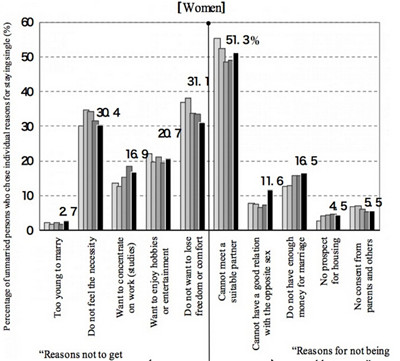
太年轻,还不想结婚 2.7%
不觉得有结婚的必要 30.4%
希望专注于事业(学业) 16.9%
希望能保留嗜好,继续享乐 20.7%
不希望失去自由或舒适的生活 31.1%
没有遇见合适的对象 51.3%
无法和异性建立良好的两性关系 11.6%
没钱结婚 16.5%
无法解决住房问题 4.5%
父母不同意或其他原因 5.5%
Reasons Japanese women give for staying single. (National Institute of Population and Social Security Research)
日本女性给出的单身理由(全国人口和社会安全调查署)
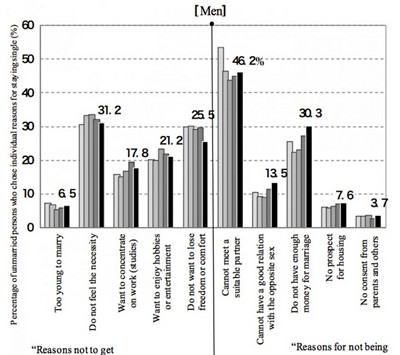
太年轻,还不想结婚 6.5%
不觉得有结婚的必要 31.2%
希望专注于事业(学业) 17.8%
希望能保留嗜好,继续享乐 21.2%
不希望失去自由或舒适的生活 25.5%
没有遇见合适的对象 46.2%
无法和异性建立良好的两性关系 13.5%
没钱结婚 30.3%
无法解决住房问题 7.6%
父母不同意或其他原因 3.7%
Reasons Japanese man give for staying single. (National Institute of Population and Social Security Research)
日本男性给出的单身理由(全国人口和社会安全调查署)
This all has major and potentially catastrophic implications for the economy. Because Japanese people aren't having kids – which is both partially a product of, and perhaps driven by some of the same factors as, their relative disinterest in sex or sexual relationships – the population is shrinking. It's shrinking very, very fast. The Japanese population dropped by 212,000 people last year, the largest decrease on record. The birth rate is still falling, with only 1.03 million live births last year, a record low and dramatic decrease from 1.21 million the year before.
日本经济因此受到灾难性的影响,因为日本人不再制造后代 – 性冷淡或恋爱不能的后果之一 – 日本的人口数量正在下降,下降的速度非常快。日本去年创纪录的减少了212,000人。出生率仍在持续降低,去年的出生人数仅为103万人,比前年的121万人大幅下降,为历史最低。
Here are two charts showing Japan's shrinking population. The first shows you the projected population over time and the second shows you the rate of change, which is just getting into negative territory:
下面的两张图显示了正在萎缩的日本人口数量,第一张显示了预计人口数量,而第二张则是人口变动率,正持续下滑至负数。
Japan's population
日本的人口
1872 to 2050 (projected)
1872年至2050年(预测)
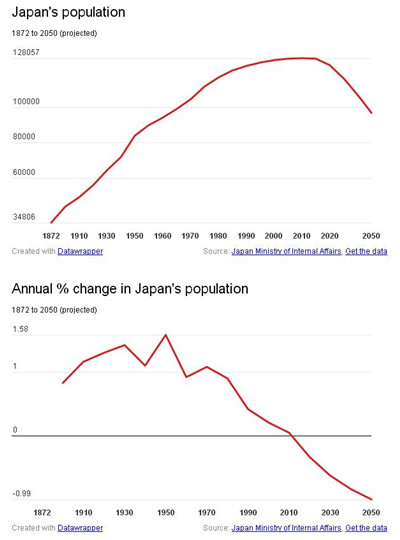
Created with Datawrapper Source: Japan Ministry of Internal Affairs, Get the data
用Datawapper软件制作的图表:数据来源于日本内务省
Annual % change in Japan's population
日本人口年变化率
1872 to 2050 (projected)
1872年至2050年(预测)
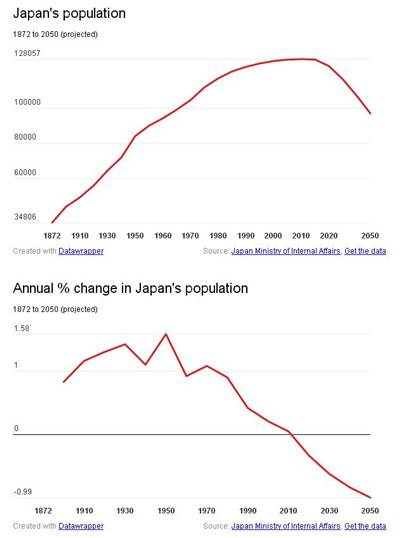
Created with Datawrapper Source: Japan Ministry of Internal Affairs, Get the data
用Datawapper软件制作的图表:数据来源于日本内务省
This isn't just bad because it means the Japanese economy will have fewer workers and thus be less productive. It's setting up an economic time bomb that will go off before long. People in Japan tend to live a long time; elderly Japanese are expensive to care for because they spend so many years in retirement and because they're accustomed to a high standard of living and medical care. For any economy to stay healthy, there need to be enough taxpayers to support all the retirees. But Japan's population is shrinking and aging simultaneously, which means that the number of old people is skyrocketing just as the base of taxpayers shrinks.
除了缺乏人手,从而导致生产力下降之外,人口年龄分布这枚定时炸弹将会在不远的未来爆炸,摧毁日本经济。日本人非常长寿;漫长的退休生涯、高水准的生活和医疗质量使老年人的看护费用居高不下。任何健康的经济体都必须保证拥有足够数量的纳税人来负担退休老人的开支。但日本人口数量下降的同时,正在步入老龄化社会。这意味着老年人的数量正在爆炸性增长,而纳税人的数量正在不断减少。
Here's a famous chart showing the age distribution of Japan's population in 1950, 2007 and projected for 2050. The 1950 chart shows a baby boom, lots of young people. The 2007 chart shows a healthy-ish economy, with lots of retirees but also lots of working-age people to support it. The right-most chart is a catastrophe. With almost one retiree for every working-age person, that's hardly sustainable.
下面这张非常著名的日本人口年龄分布图分别显示了1950年,2007年和2050年(预测)的日本人口年龄分布情况。2007年的分布图显示经济状况良好,退休人口数量多,但有充足的在职人数支撑。最右边的2050年预测图则显示了灾难性的后果,几乎每一位在职人员都需要负担一位退休老人的费用,这几乎不可能维持下去。
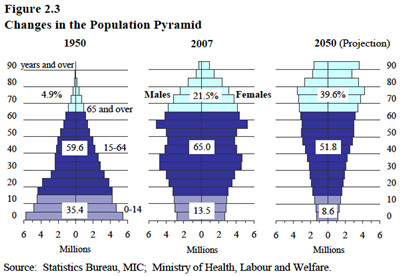
Japan's population distribution by age.
日本人口的年龄分布。
So far, this all might look like a big problem for the Japanese economy and for regular Japanese people, but not a story with major implications for those of us in the United States or elsewhere in the global economy. But here's the big problem: Japan is one of the most indebted governments in the world. Right now, Japanese public debt is 200 percent of its GDP – more even than Greece. Japan will be okay as long as it can keep growing but, with its demographic time-bomb, it's hard to see how that's possible in the long term.
到目前为止,人口问题对日本经济和日本人来说是一个重大问题,但对美国人或其他人来说并没有什么重大影响。我们将面临的大问题是:日本是世界上政府负债率最高的国家之一,公共债务是GDP的两倍,比希腊还要高。如果日本经济能保持持续增长,那就不会出问题。但人口这个定时炸弹使日本在很长一段时间里难以实现持续增长的目标。
Last year, economists Peter Boone and Simon Johnson warned in The Atlantic that Japan "could face a wave of insolvencies, triggering a broader loss of confidence" and setting off a financial crisis greater than even the Euro's. Investors could one day look at the country's aging and shrinking tax base and decide that Japan's public debt might not actually be such a safe investment, triggering a loss of confidence and possible insolvency. Given that Japan owns $1.1 trillion in United States debt, a Japanese financial collapse could be very scary for us as well. Perhaps worst of all, that could endanger China's already tenuous economic slow-down; China is Japan's largest trading partner and the two economies are closely linked.
去年,经济学家彼得.博恩和西蒙.强生在大西洋月刊中警告日本政府‘可能面临一波无力偿付(日本国债)的状况,引发更多民众失去信心',产生比欧洲更严重的经济危机。也许有一天,投资者们对日本老龄化和少子化的状况失去信心,不再把日本国债视为安全的投资,继而触发日本政府无法偿付国债的窘境。鉴于日本拥有1.1兆美元的美债,日本经济崩溃对于美国来说同样也是一场灾难。而最糟糕的是,中国的发展速度已经开始变慢,其脆弱的经济也将受到冲击。中国是日本最大的贸易伙伴,两国的经济紧密结合在一起。
Officials in Japan are keenly aware of how endangered they are by the country's low birth rate. National programs encourage young men and women to get together and politicians often debate how to create more Japanese babies. One prominent legislator, Seiko Noda, has worked on the issue since soon after taking office in 1993. In February, Noda proposed that Japan lift the birth rate by simply banning abortion. The proposal may have been facetious, but it was certainly desperate – and maybe appropriately.
日本官员清醒的认识到日本的低出生率会有多要命。他们制定了许多国家政策鼓励年轻男女交往,政治家们常常辩论如何制造更多的婴儿。著名的立法委员野田圣子(现任自由民主党总务会长,国家政策委员会委员)自1993年成为议员以后一直致力于提升日本的生育率。2014年2月,野田议员提议通过禁止堕胎来提升生育率。这项提议看上去有些可笑,但背后的绝望已经难以掩饰。
Correction: This post originally stated that Japan owns $1.1 billion in U.S. debt. In fact, it own $1.1 trillion.
更正:本文原先声称日本拥有的美国国债为11亿美元,但实际为1.1兆美元。


















